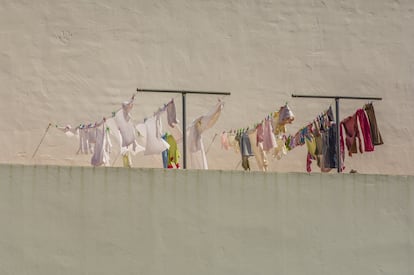“Oh, what a lovely thing Europe, all these little countries like 'oh look at me, I have a pretty high GDP per capita' but then no one has a machine to dry clothes.
It's so cute."
The author of this tweet is Josh Barro, an American
podcaster
with a provocative line and contrary to Joe Biden, who thus responded to the graphs that indicated how life expectancy in the United States is reducing and widening its gap with Europe.
His thread, which continued along that line ("oh, it's just a moment, the clothes are dried in the sun right away," he mocked) was soon filled with responses from Europeans (many Spaniards) telling him that he can keep his dryer in exchange public health and gun control.
Others sent him photos of his clotheslines and told him that, in exchange for hanging clothes like this, they received free treatment for cancer or diabetes.
The tweet and its responses (more than 3,500) would be an anecdote, one example among many of that kind of nationalist antagonism that is practiced on networks every day, if it were not for the fact that the dryers are becoming a recurring issue.
There are plenty of other tweets along the lines of “things America does better than Europe: dryers”;
"Americans have big houses, dryers and a higher probability of early death, perhaps from gunshots, the French have immunity to heart problems through alcoholism."
On Reddit, five years ago someone asked, “Non-Americans: what is it that all Americans should know?”
and one of the answers, which says "the dryers are not even half as common as in the United States", has generated in all this time a thread with more than 7,000 comments that is constantly being updated.
From the Canadian who confesses that he has never met anyone who had a washing machine but not a dryer, to an American who is surprised (“I don't understand how you can't have a dryer, what if you want to do the laundry and it's raining? what if you want to do your laundry fast? Living in other countries must be hell”).
White House laundry room.
On the wall hangs a calendar for April 1909.Shorpy.com (SHORPY)
Also, since the internet is the internet, there are several fights and clashes in this Reddit thread.
Europeans who blame energy spending and climate change on the Americans and those who reply with arguments such as "in our country clothes were hung outside in the fifties, when racism was on the rise."
It is estimated that in the United States, 80% of homes have a dryer.
It is difficult to quantify how many dryers there are in Spain.
According to the White Line Appliance Sector Report, some 200,000 units are sold per year, far fewer units than washing machines, of which 1,700,000 were sold before the pandemic.
It is also clear from the report that it is a much less demanded appliance than the refrigerator or the dishwasher.
It is very common for houses of all types, whether family, single-person,
“I have lived in four different flats in Barcelona and I only had a dryer in one.
It was handy but I don't miss it.
I prefer hanging clothes, which last longer and I spend less energy and money”, says Lauren Hopkins, an American who has lived in the Catalan capital for years.
At her parents' house in Chicago, they do.
“I asked my grandmother, who lives in Illinois, and she says that her mother used to hang her clothes in the basement during the freezing winter there.
As soon as they got a credit card, the dryer was the first thing they bought,” she explains.
Ted Stresen-Reuter lives in Las Palmas de Gran Canaria but also grew up between Chicago (with a dryer) and Arizona, in the south of the country, where he does remember seeing his mother hang out the clothes in the back garden.
“I don't have a dryer here.
We hang our clothes out on the terrace and they dry right away.
Nobody in Chicago would dream of laying out.
Before dryers, they dried their clothes in the boiler room in the basement.
I wouldn't buy one now, because of the awareness of the environment and also because I like the sensation of clothes dried in the sun.
The sheets are like crispy”.
Clothes hanging in Jerez de la Frontera. Guido Cozzi (Getty Images)
Knowing that his compatriots consider the dryer little more than a differentiating fact and a source of patriotic pride does not surprise him, but it does sadden him a little.
“When I arrived here 30 years ago I didn't miss her.
On the contrary, I liked that everything was done on the scale of the person, of the human being, being able to walk around the city”.
In a few weeks he will return to Chicago to see the family, with his partner and his two children.
Like other years, they have exchanged the house with another family and, since they will stay in the center, he did not plan to use a car.
“My father called me the other day and told me that he left me one.
I told him it was not necessary and he did not understand how we were going to spend a month without a car.
He told me: but how are you going to move?
The size of cars, like the issue of dryers, also usually comes up when these discussions take place in tweets and articles, which are actually exposing two models of life: that of the big house for each family unit, the comparatively higher salaries high taxes, geographical dispersion and privatized services versus high taxes in pursuit of a somewhat more communal lifestyle.
In many American cities there are local laws that fine those who store clothes in their garden, for aesthetic reasons, in the same way that in many Spanish municipalities there are regulations not to hang out on balconies.
For a decade, the so-called right-to-dry
movement has been gaining strength,
which aims to repeal these laws so that hanging clothes in the sun is legal.
“California is essentially a giant dryer,” cried journalist and opinion-maker Meghan Daum in a column in
the Los Angeles Times.
.
“What could be more iconic of California than an artificial turf complemented by a clothesline strung between two palm trees? How many bets your clothes dry faster in the sun in a heat wave than in your electric dryer? ”.
In the same article, Daum points out that clotheslines in the air have always been a signifier of class.
“In the late 1960s, dryers began to spread through middle-class homes.
In 1980 less than half of the families had them.
By 2009, it was already 80%.
Since then, tending to the sun has connoted poverty or lack of sophistication.
Laundry room with washer and dryer.imaginima (Getty Images)
Due to the obvious energy consumption (the OCU classifies dryers among the appliances that spend the most), but also due to the romanticization of the pre-industrial lifestyle, in recent years hanging clothes in the sun has become a signifier of bourgeois consciousness and a gesture of photogenic environmentalism.
The
cottagecore
trend , which took the world by storm a couple of years ago, also had its share of
Tik Toks
in which young women – almost always white – hung out their laundry in front of the cameras, recreating a kind of 1940s fantasy, and not something that millions of people do every day so they can have clean underwear the next day.
It is still possible to enter this social network and find very recent videos recorded without traces of irony that consist of two tall, thin girls in long dresses hanging sheets in a garden.
The caption reads: “Inspire Tuscany with Upstate New York” and the 15
hashtags
include #cottagecoreaesthetic
#hangingclothes #clothesline
#summervibes #swedishsummer
and for some reason
#callmebyyourname
.
Actually, Luca Guadagnino's film does not contain any scene in which Elio and Oliver hang their clothes.
But Sally Rooney's adaptation of
Normal People
does have its aspirational scene in which Connell and Marianne are reunited as she lays out sheets in the sun, also in Tuscany.
Scene that has probably helped establish the idea of doing the laundry as an erotic preliminary.
“The idea of hanging clothes outside in cities carries that nostalgic image that in the United States is associated with old photos of immigrant neighborhoods.
That is why it is considered somewhat photogenic in Mediterranean cities for American tourists”, believes Brian Rosa, an American researcher and geographer who lives in Barcelona (in a house that does have a dryer, but it is not used much).
Before, he also spent time in Manchester and there, due to the weather, he was surprised that the house he rented did not have a dryer.
“The whole day it rained.
People dry their clothes on the electric radiators and turn them over like a steak.
It took days to dry something.”
Rosa believes that in the American reluctance to show his clothes in view of the neighbors two aspects intersect,
the shame of conveying poverty (the family can't afford a dryer) and a certain puritanical ember.
“Just look at those scenes in old movies where a sexy woman is holding out her lingerie in public.
They were the equivalent of men chasing Swedish women in late-Franco films.”
Complaints from some of her compatriots about the lack of dryers in Europe seem "mean and boring".
Of course, he agrees with them about something: "Those washer-dryers that are sold around here are rubbish."
Complaints from some of his compatriots about the lack of dryers in Europe seem "mean and boring".
Of course, he agrees with them about something: "Those washer-dryers that are sold around here are rubbish."
Complaints from some of his compatriots about the lack of dryers in Europe seem "mean and boring".
Of course, he agrees with them about something: "Those washer-dryers that are sold around here are rubbish."






/cloudfront-eu-central-1.images.arcpublishing.com/prisa/TTTBVDACF5GRFLA3Y4DZEXTDMA.jpg)


